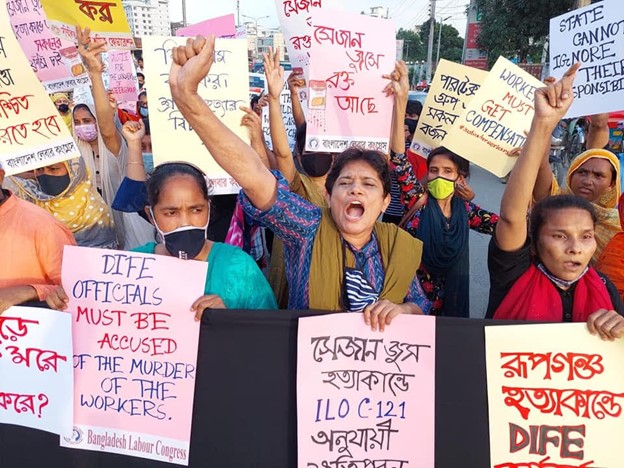
Jul 14, 2021
Worker rights advocates and the international human rights community are expressing sorrow, disbelief and outrage over the horrific fire at the Hashem Foods Ltd., factory in Bangladesh that killed at least 52 workers and more than a dozen children early this week. News reports say factory exits were locked, trapping the 200 workers inside. Three workers died jumping from the burning building.
“We believe that the fire has occurred as a result of non-compliance with law and safety regulations of the institution. This amounts to murder committed by the factory,” three major union federations said in a statement. Chemicals and flammable substances like polythene and clarified butter contributed to the blaze in the factory, and made it more difficult to bring under control, according to CNN.
The Bangladesh Garments and Industrial Workers Federation (BGIWF), Bangladesh Independent Garment Workers Union Federation (BIGUF) and Bangladesh Center for Workers Solidarity (BCWS) went on to call on the government to immediately investigate the cause of the fire and to provide fair compensation to those injured and to the families of those killed.
The owner and several top officials at the factory, owned by Bangladeshi conglomerate Sajeeb Group’s subsidiary Hashem Foods Ltd., have been arrested on murder charges. Some 2,035 people work in 11 factory buildings of Hashem Foods, which produces juice drinks, cookies and other snacks.
The fire amounts to “premeditated murder,” says Nahidul Hasan Nayan, general secretary of the Sommilito Garments Sramik Federation (SGSF). “Workers whose sweat has built palaces lost their lives due to the greed of owners, their lack of accountability, irresponsibility, brutality and lack of safety at work. We demand the culprits to be brought to swift justice.”
Bangladesh Accord Must Be Renewed
Worker rights advocates say the Hashem factory fire highlights the need for multinational brands to renew the Accord on Fire and Building Safety in Bangladesh, a landmark agreement that made factories safer for 2 million garment workers. Signed by fashion brands and unions in 2013, the Accord was set apart from previous safety agreements because it was legally binding, providing a key enforcement mechanism for workers and their unions to hold individual brands and retailers accountable.
The Accord was set to expire May 31, but corporate brands agreed to a three-month extension to allow for more time to conclude negotiations on a new binding safety agreement. Global union leaders and human rights activists say the Accord must also be expanded beyond fashion brands.
“While huge strides have been made in the garment industry safety—thanks to the Bangladesh Accord—it is a reminder that without robust and independent systems to enforce safe working conditions, the very worst can happen,” says UNI Global Union General Secretary Christy Hoffman.
Workers say that through their unions, they are able to advocate for safe working conditions without fear of being disciplined or even fired. As with the 2013 Rana Plaza collapse, that killed more than 1,100 garment workers, and the 2012 Tazreen factory fire that killed more than 112 garment workers, those at the Hashem Foods factory did not have a union to help them fight for a safe workplace or ensure children were not employed.
Says Chandon Kumar, BIGUF president: “Government agencies create investigation committees just for show. How come they did not see child labor and insufficient fire protection? We must have the right to form unions, democratic process and the freedom to speak up.”
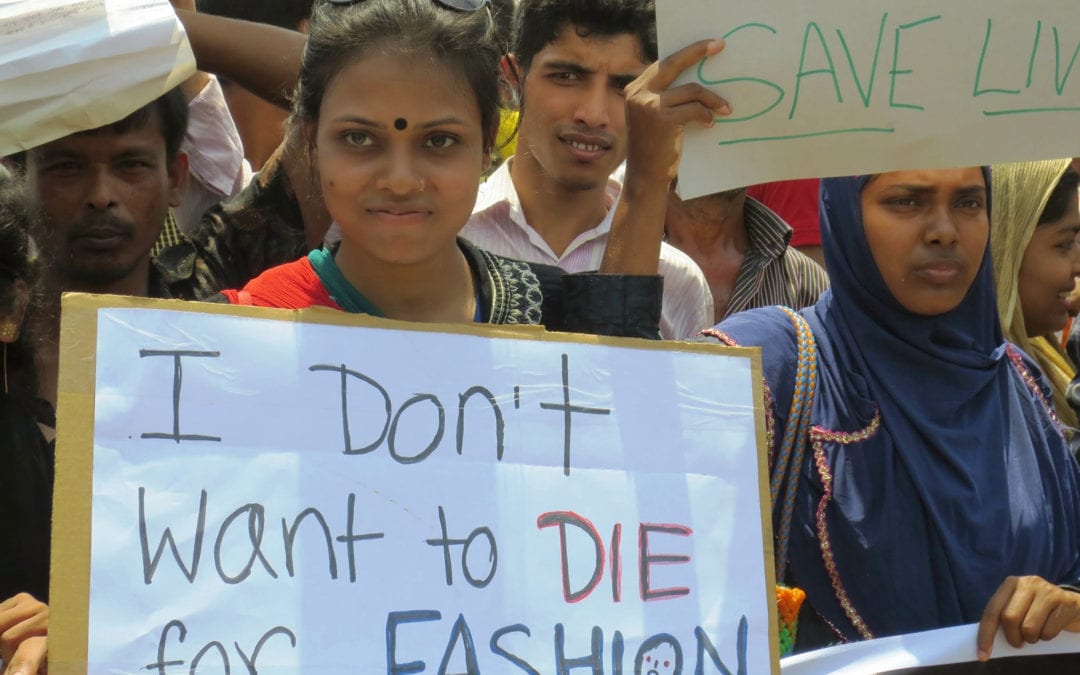
Jun 16, 2021
Jesmin Begum, a Bangladesh garment worker in her early 30s, died as she and hundreds of others rallied for unpaid wages in one of Dhaka’s Export Processing Zones (EPZs).
A sewing operator, Begum was laid off in January from Lenny Fashion, Ltd., after the factory closed. Although management said it would pay unpaid wages by May, the company never fulfilled its commitment, and workers gathered at the Nabinagar-Chandra highway outside the EPZ June 13 to demand payment.
When the workers at Lenny Fashion Ltd. and another factory that was closed by the same company refused to move from the road after two hours, the police used tear gas, rubber bullets and water cannons to disperse them, and Begum died after she fell fleeing the police violence. Dozens of workers also were injured.
“We are always told that in EPZ factories, BEPZA [Bangladesh Export Processing Zones Authority] enforces workers’ rights properly and vigorously, but BEPZA, as in many other previous cases, has miserably failed here that led to the workers’ protest and death of Jesmin,” says Babul Akhter, president of the Bangladesh Garment and Industrial Workers’ Federation (BGIWF)
Worker Rights Abused, EPZs Make Billions
Bangladesh’s eight EPZs received $333.38 million in foreign direct investment and made $7.52 billion from exports in the 2018–2019 fiscal year. Yet Bangladesh workers in EPZs face daunting odds in trying to redress often poor and dangerous factory safety and health conditions, retrieve unpaid wages or end abusive treatment by supervisors because the zones are exempt from the country’s labor laws and workers are prohibited from forming unions.
As a result, they are particularly vulnerable to worker rights abuses. Although they are allowed to organize and form workers welfare associations (WWAs) at their factories, the WWAs do not have the same rights as unions. The ILO Committee of Experts has identified numerous provisions in the WWAs that violate ILO Conventions 87 and 98 on the freedom to form unions an bargain collectively.
The terms and conditions of service for EPZ workers are regulated by BEPZA, essentially eliminating collective bargaining. Labor inspectors are not permitted to inspect factories in the zones and, unlike workers covered under the nation’s labor laws, workers in EPZs do not have the legal right to file a case challenging illegal termination.
In addition, says Akhter, “BEPZA and the employers are systematically dissolving the worker welfare associations in EPZ factories to eliminate any kind of voice of the workers in the workplace.”
With Unions, Workers Advocate for Safe Jobs
Although the government of Bangladesh in 2019 amended the EPZ law with the aim of bringing it more in line with its labor laws and international labor standards, the ILO found the new EPZ Law failed to address the vast majority of these concerns. “Importantly, the new law continues to deny EPZ workers the right to form or join a union,” according to the ILO.
“The EPZ workers must be allowed to exercise their rights to join union of their own choosing, removing the discrimination between the EPZ and non-EPZ workers,” Akhter says.
Without the ability to form unions, garment workers cannot collectively push for safety and health improvements at their workplaces. After more than 1,200 garment workers died in two tragic factory disasters in 2012 and 2013, unions have been a key partner with fashion brands in the Accord on Fire and Building Safety in Bangladesh, a landmark agreement that made factories safer for 2 million garment workers. Worker rights advocates are urging extension of the Accord, which expires in three months.
Yet the BEPZA did not allow the Accord to inspect any of the EPZ factories—all the more reason, worker advocates say, garment workers must be able to form union and collectively bargain.
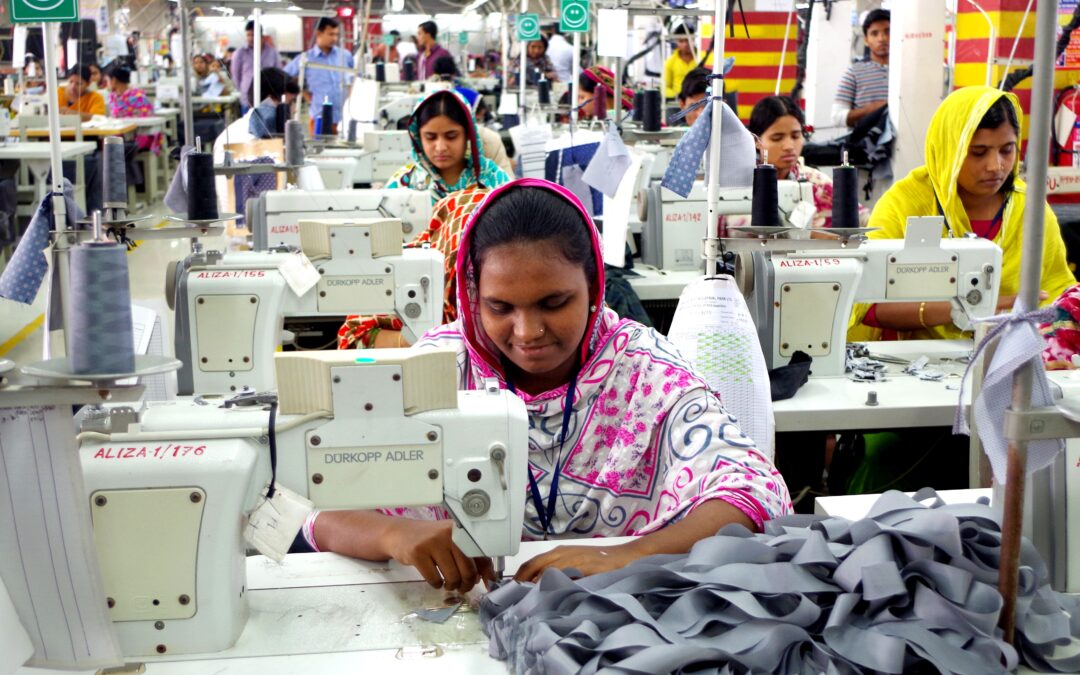
Jun 8, 2021
Worker rights and human rights advocates are urging multinational corporate fashion brands to commit to a binding successor agreement that will continue the pathbreaking work of the Accord on Fire and Building Safety in Bangladesh, a landmark agreement that made factories safer for 2 million garment workers.
Signed by fashion brands and unions in 2013, the Accord was set apart from previous safety agreements because it was legally binding, providing a key enforcement mechanism for workers and their unions to hold individual brands and retailers accountable. As a result, the Accord “has been the most successful safety program in the contemporary history of apparel supply chains,” according to a recent report by a coalition of worker rights organizations.
It was set to expire May 31, but corporate brands agreed to a three-month extension to allow for more time to conclude negotiations on a new binding safety agreement.
Accord Boosted Safety for Millions of Workers
The Accord “actively engaged with unions to ensure that workers voices are heard in the remediation process to ensure safety in the workplace,” says Rashadul Alam Raju, general secretary of the Bangladesh Independent Garment Union Federation (BIGUF).
“In five years, thousands of fire, building and electrical hazards were fixed in the [ready-made-garment] RMG factories,” he says. “As a result, safety standards were uplifted for millions of workers [and] the country has not witnessed any major accidents or loss of life in the factories inspected by Accord.”
The Accord, which now includes more than 190 brands and covers 1,600 factories, was signed after more than 1,100 garment workers were killed in the April 2013 Rana Plaza collapse in Bangladesh. Voluntary programs, with no legally binding enforcement like the Accord, failed to prevent the Rana Plaza collapse or the tragic Tazreen Factory fire that killed more than 100 Bangladeshi garment workers a few months earlier.
Accord Ensured Workers, Their Unions a Voice

BIGUF General Secretary Rashadul Alam Raju says the Accord ensured safety for millions of workers and must be extended. Courtesy Rashadul Alam Raju
Following a 2020 Bangladesh High Court decision, the Accord’s day-to-day operations were handed over to the Ready-Made Garment Sustainability Council (RSC), comprised of brands, factory owners and global and local unions. But the RSC is not legally binding and, “for all intent and purposes, is not going to bring about any real change in the factory conditions,” says Raju.
Crucially, the Accord supported an environment in which workers’ voices could be heard through collective bargaining between unions and employers, enabling unions to protect workers’ safety and ensuring they woud not be targeted by managers for speaking out about their workplace rights.
“The Accord was very much proactive in engaging with the unions in its work to ensure safety for the workers,” says Raju. “This also ensured protection to the workers and unions from being victimized by the employers. But such protection with RSC is virtually non-existent.”
Bangladesh garment workers, primarily women who often are subject to brutal verbal and even physical violence for supporting unionization, were able to form dozens of unions in the wake of the Accord, with tens of thousands achieving first-ever rights on the job.
Raju and other Bangladesh union leaders say the Accord’s signatory brands must agree to a new binding safety agreement that ensures safe work, remains individually enforceable upon brands, keeps an independent secretariat in place that oversees the brands’ compliance and allows for expansion to other countries.
Although brands committed in January 2020 to negotiate a new binding agreement with the option to expand to other countries, they since have offered only a watered-down version of the Accord.
A renewed agreement is urgently needed, union leaders say, because much work still must be done to ensure factory safety in Bangladesh and around the world. A renewed agreement offers the possibility of expanding factory safety and health to other countries, where recent disasters underscore the need to address life-threatening work environments.
The bottom line, says Raju, is that unions must be part of any new agreement, “but it has to be legally enforceable.”
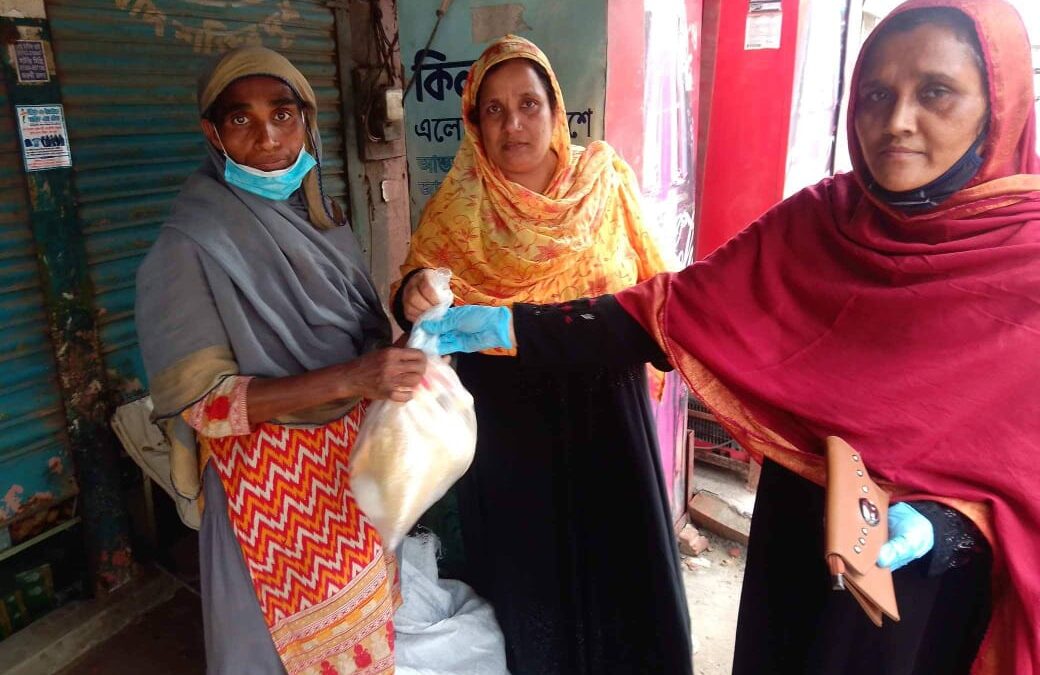
Dec 10, 2020
As garment factories shut down in Bangladesh during the novel coronavirus pandemic, leaving workers without wages or access to support services, unions and Worker Community Associations (WCAs) around the country rapidly shifted to address the crisis, with Worker Community Centers (WCC) serving as a lifeline for workers, their families and their communities.
The community associations and centers are part of an ongoing USAID-funded Solidarity Center Workers’ Empowerment and Participation project (WEP) launched in 2019 to improve working conditions for workers in the ready-made garment and shrimp and fish processing sectors in Bangladesh. The project builds on the strong foundation WEP established between 2015 and 2019.
In July, the Solidarity Center delivered 30,000 COVID-19 awareness leaflets to its partners in Dhaka and nearby Ashulia, Gazipur, Narayanganj and Savar; as well as Chattogram, Jashore and Khulna. The pamphlets, distributed to thousands of workers and community members by WCC coordinators and union federation organizers, highlight key safety measures during the COVID-19 pandemic, such as proper hand washing, social distancing and wearing masks at all times when outside the home.
“It’s important for us to do our part to get accurate information to everyone in the community to help stop the spread of this deadly virus,” says Rita Saha, WCC coordinator in Rupsha. “Our WCC leaders and members have extensive networks, and we love raising awareness and helping our community.”
Ensuring Fair Wages, Decent Working Conditions

When AFCO garment factory closed during COVID-19, workers received unpaid wages due to their union’s efforts. Credit: Solidarity Center
Even as WCCs and unions distributed resources, including food baskets to families of furloughed garment workers during Ramadan, they carried on the crucial work of ensuring workers receive fair pay during factory shutdowns.
As AFCO Abedin Garments Ltd. got set to permanently close in April without paying workers’ back wages, the Garments Workers Solidarity Federation (GWSF) launched negotiations with management and encouraged the Department of Inspection for Factories and Establishments and the Bangladesh Garment Manufacturers and Exporters Association to intervene. Ultimately, factory management agreed to pay the workers 60 percent of their April salary, one month’s base salary and 60 percent of the base wage for each full year of service. Eligible workers also will receive seven days’ annual leave.
In June, Hop Lun Apparels Ltd., Sammilito Sramik Union (HLALSSU) successfully negotiated a 24-point collective bargaining agreement with factory management covering more than 2,000 workers.

Union members at Hop Lun garment factory negotiated a contract that addresses violence at work. Credit: Solidarity Center
“When we submitted demands and negotiated with management, we gave special emphasis on the issues of women,” says Aklima, factory union president. “The guarantee of promotion of women to higher posts and the establishment of sexual harassment committee will empower the women and provide safeguards against sexual abuse and harassment in our factory.”
Training, Legal Support
The Workers’ Empowerment and Participation program also carried out leadership training and legal support that included advising more than 450 workers and winning $10,835 in court for 41 workers. Additional accomplishments over the past year include:
- 27,213 workers covered by unions in more than 200 factories
- 104 women elected to leadership positions
- 2,209 new community members actively participating in Worker Community Associations
- 21 new unions and worker-driven organizations in the garment and shrimp processing sectors and 12 new garment unions registered
- 39 worker-leaders trained in achieving equality or women’s empowerment at public and private organizations
“The WCC training sessions helped make me more confident and brave, and have helped me understand violence and harassment,” says one woman garment worker. “This has made it easier for me to handle tough situations at my workplace and in the community.”
Find out more about the Workers Empowerment Project.
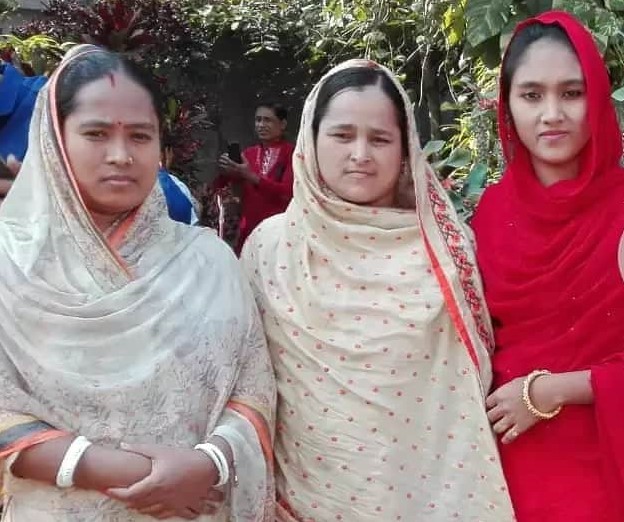
Jul 30, 2020
After hundreds of laid-off garment workers took to the streets of Ashulia, Bangladesh, and rallied at the Dhaka Export Processing Zone in recent weeks, factory management and the Bangladesh Export Processing Zones Authority agreed to compensate them with one month’s wages and the annual Eid festival bonus.

Maksuda: “When we united together, management had no choice.” Credit: Shumon Ali
Because all 130 retrenched workers had worked at the factory less than a year, the company was not required by law to provide them with compensation after they were laid off. Yet all the workers received between $150 and $315, a major achievement that Maksuda, one of the factory workers who took part in the action, says resulted from unity and collective action.
“I did not think we would get it, but when we united together management had no other choice. I am quite happy with the money I have received.”
The Talisman Limited factory workers are among tens of thousands of Bangladesh garment workers who have lost their jobs because of declining clothing orders worldwide following outbreak of the COVID-19 pandemic. The government reports that 29,369 garment workers have been laid off, but union leaders say the numbers are much higher.
Garment Workers Stand Together to Win Pay after Country-wide Layoffs
Workers and unions have been taking action at factories around the country in response to layoffs, and in many cases have blocked traffic or halted work to have their demands met. Overall, Bangladesh has lost more than $3.18 billion in orders since April and the start of COVID-19, according to the Bangladesh Garment Manufacturers and Export Association.
Maksuda, like the other retrenched factory workers, received her layoff notice by text message. Desperate to support her family, she joined with Farida, Tania and 11 other laid-off garment workers to contact the Solidarity Center for assistance.
The Solidarity Center legal team advised each worker to seek one month’s basic pay as compensation, along with a festival bonus. The next day, the leaders organized all the retrenched workers and went to the factory, but they found the factory gates locked and no management in sight, so they proceeded to the Dhaka Export Processing Zone to demand payment. In the process, they set an example of the concrete gains collective action can achieve.
Talisman Limited employs some 1,200 workers, at least 70 percent of whom are women.









